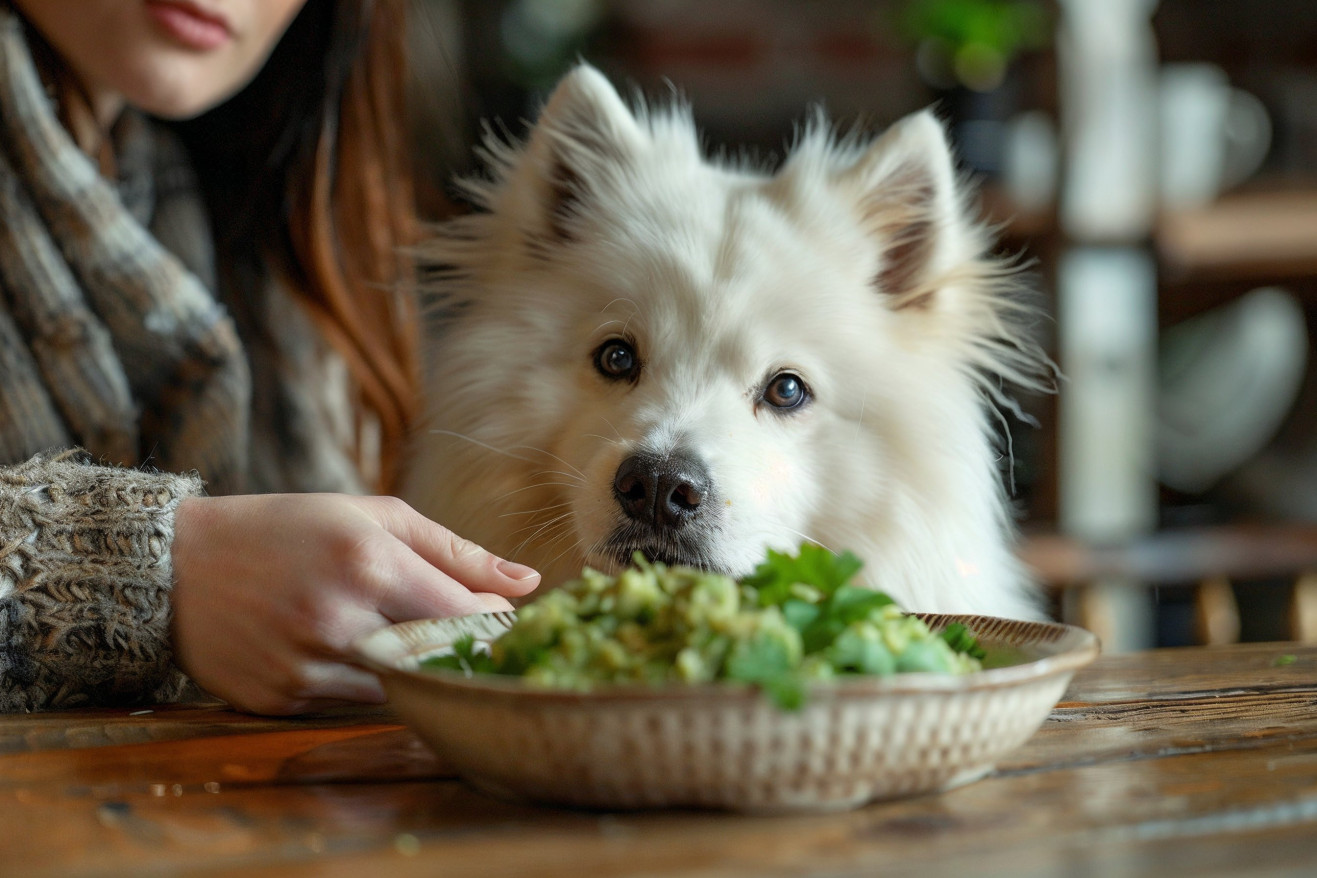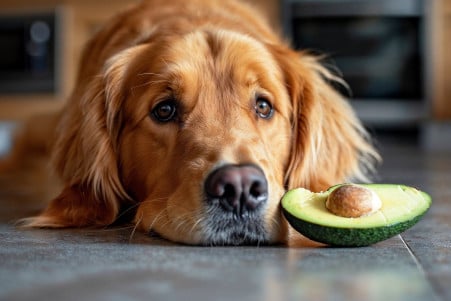Can Dogs Eat Guacamole? What You Need to Know About Avocado and Other Toxic Ingredients
28 February 2024 • Updated 27 February 2024

Guacamole is a delicious, creamy treat that many people love, but is it safe for your dog to eat? No, dogs cannot eat guacamole. The ingredients in guacamole, including avocado, which contains persin, as well as onions and garlic, are toxic to dogs. These ingredients can lead to vomiting, diarrhea, and more severe conditions like pancreatitis and anemia in dogs.
This article will explore the extensive research in veterinary science and toxicology literature on the effects of guacamole’s ingredients on dogs.
It will also look at peer-reviewed research on the digestion and metabolism of dogs to explain why certain foods are toxic. By the end, you’ll have a thorough understanding of what makes up a healthy diet for your dog, allowing you to keep them safe and provide them with alternative foods that will still appeal to their palate.
Can dogs eat guacamole?
Why Avocado Is Bad for Dogs
Avocados are a healthy food for people to eat, but the presence of persin, a fungicidal toxin, makes them dangerous for dogs. While dogs are more resistant to persin than other animals, according to Purina, large amounts of persin can still cause health problems. Symptoms of persin poisoning in dogs can include vomiting, diarrhea, and in the most severe cases, myocardial damage, although Wag Walking says that these reactions are rare.
The danger of avocados for dogs goes beyond persin. The avocado pit is a choking hazard and can cause gastrointestinal blockages that may require surgery because of the danger they pose.
It’s also important to note that the danger of avocados is different from the danger of processed avocado products. Dog food that contains avocado derivatives like avocado oil or meal is generally safe. These products contain very small amounts of persin and can be good for dogs because of their vitamin and healthy fat content.
If a dog eats avocado, it’s important to watch the dog closely for signs of distress and seek veterinary care if the dog shows any symptoms. This can help prevent serious health problems, as the ASPCA points out.
The Risks of Onions and Garlic for Dogs
Onions and garlic are both common ingredients in guacamole, but they are also toxic to dogs. According to VCA Animal Hospitals, the disulphides and thiosulfinates in onions and garlic are toxic to dogs. When consumed, these compounds can cause oxidative damage to red blood cells, leading to hemolytic anemia.
The PDSA explains that symptoms of Allium toxicity can be mild and include gastrointestinal upset like vomiting and diarrhea, or they can be more serious and include loss of appetite, weakness, and even collapse. Symptoms can occur within hours of ingestion or take several days to appear.
In addition to hemolytic anemia, Allium toxicity can also cause Heinz body formation and methemoglobinemia, which can make the situation even more dire for the dog, according to the Merck Veterinary Manual.
Treatment for Allium toxicity may include inducing vomiting, administering activated charcoal, and providing supportive care like intravenous fluids and oxygen. The PDSA stresses that the sooner a dog is seen by a vet, the better the prognosis.
Make sure that any foods that contain onions and garlic are kept out of your pet’s reach, and always check pre-made foods for these ingredients to make sure they are safe for your dog. As a responsible pet owner, it is important to make sure that your dog’s diet is free of these toxic ingredients to protect their health and well-being.
Understanding Your Dog’s Dietary Needs: Digestion and Metabolism
Dogs have a digestive system that is well-suited to handling both animal and plant matter, which is why they are considered facultative carnivores. Their metabolism is efficient at extracting energy from their food, but it is also delicate and easily influenced.
For example, a study in the Journal of Animal Science and Biotechnology showed that dogs can have difficulty synthesizing certain amino acids, which are essential to their well-being, which underscores the importance of a diet that supplies all the necessary nutrients in the right proportions.
The canine gut microbiome is essential to the digestive process. A study published in PMC showed that the gut microbiome not only aids in the digestion of food but also helps the immune system develop and impacts physiological processes. The consumption of toxic compounds like persin in avocados or disulphides in Allium vegetables can disrupt a dog’s gut microbiome and metabolic processes, which can lead to health problems.
In order to ensure that your dog stays healthy, you need to feed them a diet that is tailored to their specific digestive system. A study in PMC that looked at the metabolic profiles of dogs fed different diets showed that the food dogs eat has a major impact on their health, including how their metabolic and inflammatory systems respond.
This makes it important to make sure that you are feeding your dog the right food so that you can avoid these problems and ensure that they are as healthy and happy as possible.
Healthy Snacks: Dog-Safe Fruits and Vegetables
If you want to spoil your furry friend with a healthy snack, there are plenty of fruits and vegetables that are not only safe for dogs but can also provide some health benefits. Forbes notes that carrots, celery, and green beans are all great options because they are full of vitamins and low in calories, which is important for a dog’s diet.
Meanwhile, the American Kennel Club explains that apples (without seeds and the core) can provide vitamins A and C, and blueberries are full of antioxidants that are good for a dog’s overall health.
Of course, it’s important to make sure that you prepare the snacks properly; for example, you’ll need to make sure that you remove the seeds from the apples and the pits from the peaches to avoid any potential problems.
The ‘10% rule’ is a good way to think about it, as it suggests that treats should only account for 10% of your dog’s daily calorie intake, which will help ensure that they are getting a well-balanced diet, according to Pupford.
If you want to whip up a dog-friendly snack, try combining some cooked, pureed pumpkin with some banana slices for a healthy treat.
And, as always, make sure that you introduce new foods slowly and in small amounts so that you can watch for any negative side effects. By making and giving your dog these healthy, homemade snacks, you can help ensure that they stay healthy and avoid the risks that come with guacamole and its harmful ingredients.
Final Thoughts on Feeding Fido: Understanding Canine Dietary Safety
As we have discussed, all of the ingredients in guacamole—avocado, onions, and garlic—are toxic to dogs. Persin in avocados and disulfides and thiosulfates in Allium vegetables can result in a variety of symptoms in dogs, ranging from gastrointestinal distress to more severe issues like pancreatitis and anemia.
Knowing a dog’s dietary needs is essential to their health. A diet that is formulated to meet a dog’s digestive and metabolic needs is necessary to keep them healthy. As a responsible pet owner, it’s important to know which foods are toxic and to offer safe dietary options that provide nutrition without the risk.
We recommend that pet owners work with their veterinarians to get individualized dietary recommendations that will help ensure their pets’ health and safety. Part of being a responsible pet owner is knowing what to avoid and making better choices for our pets. After all, the choices we make for our pets will impact their lives.


